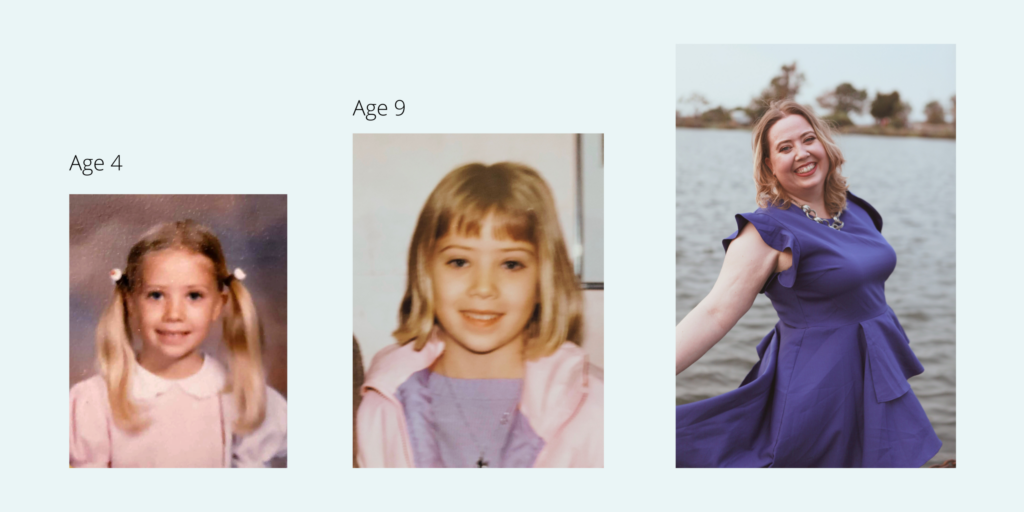I have been enjoying all of the inspiring stories women have been sharing in support of the International Day of the Girl Child the past few weeks!
Each story is a window into the experiences that shaped a person’s worldview. They are stories of resilience, adaptability, courage, curiosity, and pride.
I may be late to this party, but better late than never.

This Little Girl Is Me
At age 4, my parents, three siblings, and I moved from rural Nebraska to Central California, a strange mix of agribusiness and suburban life. I was a bright girl with tons of charisma and confidence, so I took it as my due when I tested into the top percentile and started Kindergarten less than a month later.
By age 9, I had lost all of that confidence and retreated into a shy, sad girl, always afraid of the next decimation. My parents were locked into a cycle of abuse caused by addiction, poverty, co-dependency, and emotional insecurity stemming from their own childhood abuses. For the next 8 years, I was subsumed into this miasma, but learned to survive by focusing my ample will on achieving one goal: “Be Successful: Get Out. Get A Degree. Do Not Get Attached.”
At 17, my parents and I loaded up the back of my Dad’s truck and we started the 250-mile journey to UC Santa Barbara, where I would start my freshman year. At about 3 miles away from home, my father turns to me and says, “It’s not too late to turn around and go home. Your Mom and I are pretty sure that you don’t have what it takes to make it at this university. Wouldn’t it be better to quit before you fail?” To this day, I don’t know if they said this to me to test me, or because they believed it.
Regardless, it lit the proverbial fire under me, “HA! I’ll show YOU!”

Our Stories Shape How We See The World
My subsequent need to prove myself to doubters and to overachieve for my supporters are tributaries to the “I’m not good enough” river. I spent a lot of energy people-pleasing, which made me more useful, not necessarily more valuable.
Sidebar: As a means to gain control, I blamed others and tried to “fix them” so I could remain a victim of circumstances and therefore not responsible for my baggage. “If I could just fix them,” I thought, “I won’t get hurt as often.” I spent a lot of energy trying to fix others, but still got hurt.
With more age, perspective, and emotional resilience skills, the problem is not how others see me or treat me, but rather how I see myself and enforce boundaries. The more empowered I become, the less I try to please & fix.
I graduated in 4 years from UCSB with a 3.9 GPA, then started in the medical industry as a billing team lead, and soon was running a multi-million dollar surgery practice, managing a team of 5 by the time I was 23.
I ran out of goals for that career, so switched gears and got my M.A. Applied Anthropology, with a thesis on Organizational Change. I spent about 3 years building relationships and working towards an academic career, with a path toward being one of an exclusive number of anthropologists writing ethnohistory, but I ultimately decided that I wanted to work in business instead.
I landed in Tech immediately after graduating, working for a series of startups and mid-sized companies, each time thanks to a leader who saw something in me and gave me a chance to prove myself. I leaped ahead in scope and responsibility at every opportunity, ultimately becoming Director of Sales Enablement and one of a tiny percentage of female leaders. My particular brand of success was shifting sales teams from startup to growth stage, which required considerable cultural change and implementing processes for scalability.
At 41, I have switched gears again into my FOURTH career: Empowering individuals and organizations to create inclusive cultures.
Building this business pulls from all of my strengths:
- Business development from my first career
- Analysis and ethnographic techniques from my second career
- Teaching, coaching, skills to navigate difficult conversations, cultural change, and the experience of being a minority from my third career
I am proud to be in a position where my childhood challenges, educational richness, and career journeys have created a solid foundation to try, fail, learn, repeat. Despite my successes, I have a lifetime yet to learn about leadership! I’m incredibly grateful to all of my previous leaders and current mentors that challenge me and help me to focus.
Changing How You See the World
Monday, October 11 was the official International Day of the Girl Child, as well as Indigenous Peoples’ Day and Columbus Day here in the USA, which represent and celebrate dramatically different perspectives about American history.
The confluence of these three holidays is striking: each is asking us to consider the narratives about ourselves and our worldview.
#ThisLittleGirlIsMe asks women to share their stories, many of which focus on overcoming adversity to achieve success in their careers. Indigenous Peoples’ Day commemorates Native American histories & cultures and asks Americans to stop celebrating the legacy of Christopher Columbus. Columbus Day began as a way to halt violence against Italian Americans, who were at the time not considered to be white. Today, Columbus Day is celebrated as a representation of the “beginning of America”, but it also erases Native American history and lionizes a man who committed genocide.
The Day of the Girl Child amplifies the representation of women’s stories. Indigenous Peoples’ Day amplifies the representation of Native American stories. Columbus Day amplifies the representation of Italian American (and generally white American) stories.
Empathy is hard-wired for humans, but it’s not automatic. If the idea of replacing Columbus Day with a day for Indigenous People makes you uncomfortable, try activating your empathy. Listen to the stories of others and connect to the human side – you could discover a new way of seeing the world.
Self-awareness questions to journal about:
- Why does Columbus, the man, matter to me (what does he represent)?
- What do I feel like I’m losing in order to reject the story of Columbus as a hero?
- Paradox is the opposite of polarization. How can I make space to hold regard for both narratives: Columbus paved the way for the America that I love, and the genocide of Indigenous Peoples that began with Columbus is an atrocity.